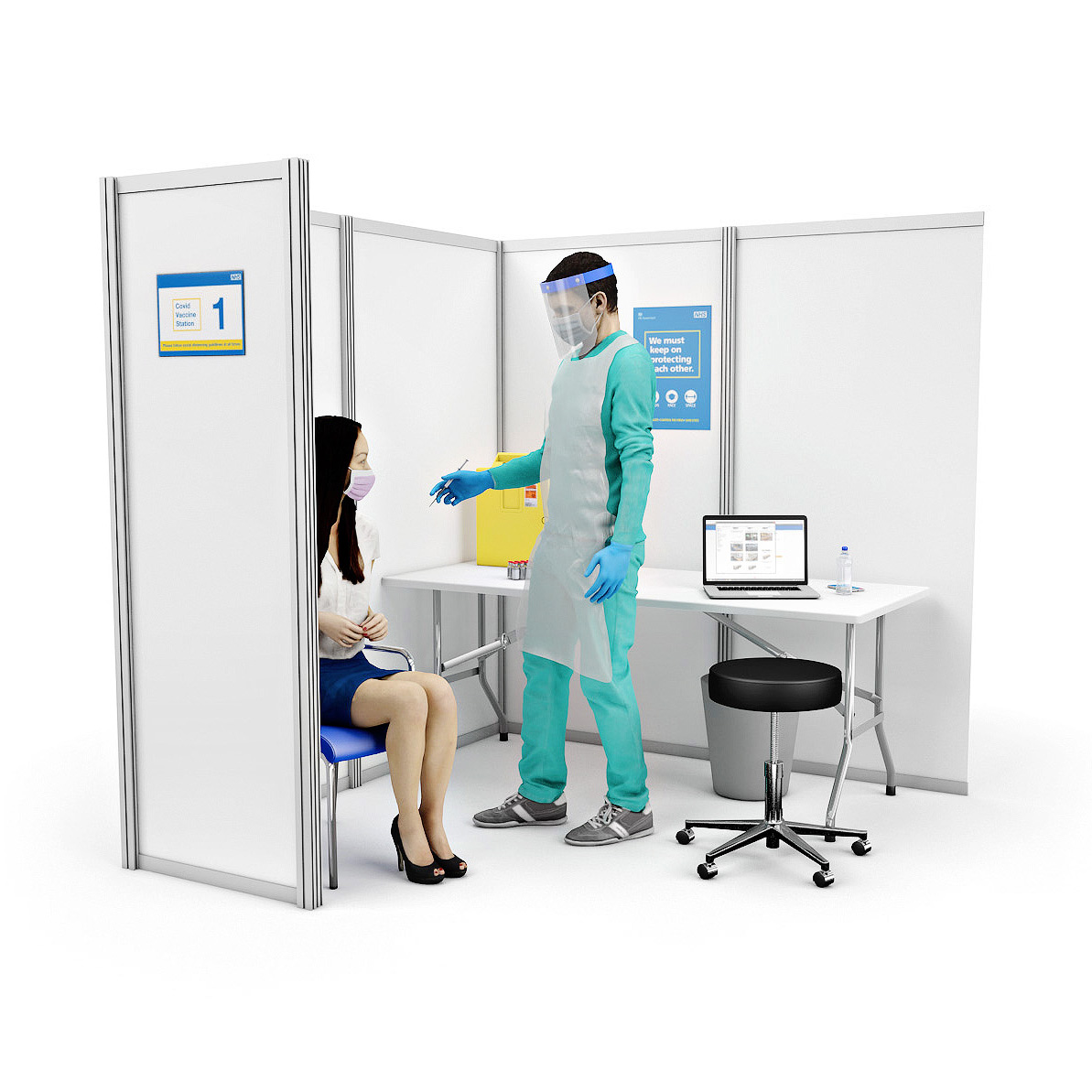Medical Screens are partition screen designs used in hospitals and health care environments, by the NHS and healthcare professionals as privacy dividers between beds and care stations in hospital wards, ICUs, operating theatres and treatment rooms. Freestanding dividers are the most versatile solution, especially if they are mobile and mounted on wheels, as they can be relocated quickly, allowing ward layouts to be re-configured in line with changing demands. This is particularly useful during the pandemic, as medical spaces are having to be constantly reworked to reflect the changing case numbers in hospitals across the country.
While medical screens are designed to be easily cleaned and sanitised, making them ideal as dividers between patients, they are also an essential tool for patient privacy. The opaque screen designs in particular offer hospitals and medical facilities a flexible and adjustable way to ensure that patients are offered private, screened areas; even in rooms or wards that have had to be repurposed due to the Coronavirus pandemic. Large, open-plan spaces can be divided into individual cubicles or bed areas using patient privacy screens, giving patients a space of their own and medical staff additional room to work.
Read on to find out more about the importance of patient privacy screens in the healthcare industry.
What are patient privacy screens?
Patient privacy screens and medical dividers are designed to form protective and private shield barriers between patients and staff, allowing vaccinations, COVID testing or other medical treatments to take place in privacy, while also preserving social distancing measures.
Privacy screens are typically manufactured from high-quality Perspex® acrylic or gloss aluminium panels with aluminium or powder-coated steel frames, all non-porous materials which do not absorb liquid, making them easy to wipe down and sanitise between each patient to remove any lingering traces of viruses or bacteria. As a result, they are extremely practical for medical purposes, particularly during a pandemic. Traditional fabric dividers and curtain screens can be made with antimicrobial properties within the weave, but with long-term use, this can degrade and allow bacteria to spread. In contrast, our collection of metal and Perspex® medical screens are designed to give you a durable, efficient and cost-effective alternative.
If you browse our range of medical screens, you’ll see it includes both transparent Perspex® dividers and opaque white gloss aluminium panels. These are equally suitable for social distancing and hygiene purposes, but the white gloss panels have the additional privacy element, making them a more versatile choice, as they can be used to separate ICU or ward beds, offering patients privacy even in busy locations.
What are the types of patient medical screens?
Our range of patient privacy screens fall into four main categories:
- Medical Screens on Wheels - our mobile patient privacy screens have castor wheels with lockable brakes fitted to the bottom frames, meaning you can move them around quickly and easily. Hospital screens with lockable castor wheels on the base can be helpful in a wide range of circumstances. In addition, these screens can be linked together to form ‘pods’.
- Vaccination Screens - these screens have been designed specifically to offer medical practitioners and pharmacists additional protection when administering arm vaccines or taking blood samples. The 2m-high panels have a vertical access gap of W250mm x H600mm to allow easy arm insertion.
- Medical Booths - these ‘pod’ kits have been designed to be modular and freestanding; for ease of installation, the metal components bolt together and panels slide in. Each three-sided cubicle can be linked to two-sided ‘extension pods’ to form a line of three-sided cubicles. They measure 2.4m x 2.4m, and 2m high (standard NHS specified cubicle size) but we can manufacture bespoke sizes if required.
- Folding Medical Dividers - our DIGNITY® Screens are mobile folding screens with solid panels that are easily movable via strong castor wheels on each section. The screens fold together to occupy a reduced floor space, allowing full stability when used in a straight line or concertina them in a zigzag formation.
What are the benefits of patient privacy screens?
- They are specifically designed for medical use - they are manufactured from non-porous, hygienic materials which can be easily sanitised for a safe, healthy environment. For this reason, they are also highly effective social distancing screens.
- They create private spaces for patient dignity - particularly our medical screens with opaque panels. These can be used to form private spaces even in busy A&E or ICU departments, or on wards - particularly important during a pandemic where bed spaces can become limited.
- They offer a cost-effective solution - in comparison to curtains or fabric panels, our medical patient privacy screens are durable and longwearing, making them an excellent investment for the long term.
- They are easy to relocate - the majority of our medical screens are mobile; they have lockable castor wheels attached to the base. You can move these around easily to wherever you need them most, making them an incredibly practical solution

DIGNITY® PLUS Mobile Hospital Medical Screens

COVID Vaccination Booth Cubicles
As we move into what are hopefully the final stages of the pandemic, it’s important to keep our hospitals prepared and ready should a new variant of the virus emerge to once again put our NHS under strain. Medical patient privacy screens are a simple, effective and easy way to divide up hospital beds and are therefore a key product for medical facilities all year round.
For more information about any of our medical screens, pods or dividers, you can get in touch with our expert team via our Contact Us page or by calling 01234 676767.
Permalink:
https://officescreens.co.uk/blog/the-importance-of-patient-privacy-screens-in-the-healthcare-industry.aspx